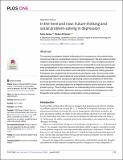Files in this item
In the here and now : future thinking and social problem-solving in depression
Item metadata
| dc.contributor.author | Noreen, Saima | |
| dc.contributor.author | Dritschel, Barbara | |
| dc.date.accessioned | 2022-07-07T14:30:08Z | |
| dc.date.available | 2022-07-07T14:30:08Z | |
| dc.date.issued | 2022-06-30 | |
| dc.identifier | 280313325 | |
| dc.identifier | f80285b8-2740-49fe-918e-36b536554392 | |
| dc.identifier | 85133351031 | |
| dc.identifier | 000892027900221 | |
| dc.identifier.citation | Noreen , S & Dritschel , B 2022 , ' In the here and now : future thinking and social problem-solving in depression ' , PLoS ONE , vol. 17 , no. 6 , e0270661 . https://doi.org/10.1371/journal.pone.0270661 | en |
| dc.identifier.issn | 1932-6203 | |
| dc.identifier.other | RIS: urn:786DE4C10B80617A67B19C5C2D6B5F4F | |
| dc.identifier.other | ORCID: /0000-0002-0909-6323/work/115309188 | |
| dc.identifier.uri | https://hdl.handle.net/10023/25626 | |
| dc.description.abstract | This research investigates whether thinking about the consequences of a problem being resolved can improve social problem-solving in clinical depression. We also explore whether impaired social problem solving is related to inhibitory control. Thirty-six depressed and 43 non-depressed participants were presented with six social problems and were asked to generate consequences for the problems being resolved or remaining unresolved. Participants were then asked to solve the problems and recall all the consequences initially generated. Participants also completed the Emotional Stroop and Flanker tasks. We found that whilst depressed participants were impaired at social problem-solving after generating unresolved consequences, they were successful at generating solutions for problems for which they previously generated resolved consequences. Depressed participants were also impaired on the Stroop task, providing support for an impaired inhibitory control account of social problem-solving. These findings advance our understanding of the mechanisms underpinning social problem-solving in depression and may contribute to the development of new therapeutic interventions to improve social-problem solving in depression. | |
| dc.format.extent | 22 | |
| dc.format.extent | 570059 | |
| dc.language.iso | eng | |
| dc.relation.ispartof | PLoS ONE | en |
| dc.subject | BF Psychology | en |
| dc.subject | DAS | en |
| dc.subject | MCC | en |
| dc.subject.lcc | BF | en |
| dc.title | In the here and now : future thinking and social problem-solving in depression | en |
| dc.type | Journal article | en |
| dc.contributor.institution | University of St Andrews. Institute of Behavioural and Neural Sciences | en |
| dc.contributor.institution | University of St Andrews. School of Psychology and Neuroscience | en |
| dc.identifier.doi | https://doi.org/10.1371/journal.pone.0270661 | |
| dc.description.status | Peer reviewed | en |
This item appears in the following Collection(s)
Items in the St Andrews Research Repository are protected by copyright, with all rights reserved, unless otherwise indicated.

